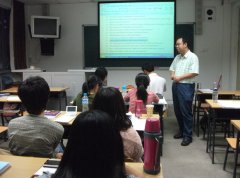 您的位置:英语
您的位置:英语
英语阅读理解模拟试题(一)
- 发布日期:2012-06-26

Passage1
We can make mistakes at any age. Some mistakes we make are about money. But most mistakes are about people.“Did Jerry really care when I broke up with Helen?”“When I got that great job, did Jim really feel good about it, as a friend? Or did he envy my luck?”“And Paul-why didn’t pick up that he was friendly just because 1 had a car?”When we look back, doubts like these can make us feel bad. But when we look back, It’s too late.
Why do we go wrong about our friends–or our enemies? Sometimes what people say hides their real meaning. And if we don’t really listen we miss the feeling behind the words. Suppose someone tells you,“You’re a lucky dog .”that’s being friendly. But“lucky dog”? There’s a bit of envy in those words. Maybe he doesn’t see it himself. But bringing in the“dog”bit puts you down a little. What he may be saying is that the doesn’t think you deserve your luck.
“Just think of all the things you have to be thankful for”is another noise that says one thing and means another. It could mean that the speaker is trying to get you to see your problem as part of your life as a whole. But is he? Wrapped up in this phrase is the thought that your problem isn’t important. It’s telling you to think of a all the starving people in the world when you haven’t got a date for Saturday night.
How can you tell the real meaning behind someone’s words? One way is to take a good look at the person talking. Do his words fit the way he looks? Does what he says agree with the tone of voice? His posture (姿态)? The look in his eyes? Stop and think. The minute you spend thinking about the real meaning of what people to you may save another mistake.
1. This passage is mainly about .
A)how to interpret what people say
B)what to do when you listen to others talking
C)how to avoid mistakes when you communicate with people
D)Why we go wrong with people sometimes
2. According to the author, the reason why we go wrong about our friends is that .
A)We fail to listen carefully when they talk
B) People tend to be annoyed when we check what they say
C)People usually state one thing but means another
D)We tend to doubt what our friends say
3. In the sentence“Maybe he doesn’t see it himself.”In the second paragraph, the pronoun“it“refers to.
A) being friendly C) lucky dog
B) a bit of envy D) your luck
4. When we listen to a person talking, the most important thing for us to do is .
A)notice the way the person is talking
B)take a good look at the person talking
C)mind his tone, his posture and the look in his eyes
D)examine the real meaning of what he says based on his manner, his tone and his posture
5. The author most probably is a .
A) teacher C) philosopher
B) psychologist D) doctor
Passage 2
A moment’s drilling by the dentist may make us nervous and upset. Many of us cannot stand pain. To avoid the pain of a drilling that may last perhaps a minute or two, we demand the“needle”- a shot of novocaine (奴佛卡因)-that deadens the nerves around the tooth.
Now it’s true that the human body has developed its millions of nerves to be highly aware of what goes on both inside and outside of it. This helps us adjust to the world. Without our nerves - and our brain, which is a bundle of nerves - we wouldn’t know what’s happening. But we pay for our sensitivity. We can feel pain when the slightest thing is wrong with any part of our body. The history of torture is based on the human body being open to pain.
But there is a way to handle pain. Look at the Indian fakir(行僧) who sits on a bed of nails. Fakirs can put a needle right through an arm, and feel no pain. This ability that some humans have developed to handle pain should give us ideas about how the mind can deal with pain.
The big thing in withstanding pain is our attitude toward it. if the dentist says,“This will hurt a little,”it helps us to accept the pain. By staying relaxed, and by treating the pain as an interesting sensation (感觉), we can handle the pain without falling apart. After all, although pain is an unpleasant sensation, it is still a sensation, and sensations are the stuff of life.
6. The passage is mainly about .
A) how to suffer pain
B) how to avoid pain
C) how to handle pain
D) how to stop pain
7. The sentence“But we pay for our sensitivity.”in the second paragraph implies that .
A) we should pay a debt for our feeling
B) we have to be hurt when we feel something
C) our pain is worth feeling
D) when we feel pain, we are suffering it
8. When the author mentions the Indian fakir, he suggests that .
A) Indians are not at all afraid of pain
B) people may be senseless of pain
C) some people are able to handle pain
D) fakirs have magic to put needles right through their arms
9. the most important thing to handle pain is .
A) how we look at pain
B) to feel pain as much as possible
C) to show an interest in pain
D) to accept the pain reluctantly
10. The author’s attitude towards pain is .
A) pessimistic B) optimistic C) radical (极端的) D) practical
Passage 3
Thirty-two people watched kitty Genovese being killed right beneath their windows. She was their neighbor. Yet none of the 32 helped her. Not one even called the police. Was this in gunman cruelty? Was it lack of feeling about one’s fellow man?
“Not so,”say scientists John Barley and Bib Fatane. These men went beyond the headlines to probe the reasons why people didn’t act. They found that a person has to go through two steps before he can help. First he has to notice that is an emergency.
Suppose you see a middle-aged man fall to the side-walk. is he having a heart attack? is he in a coma (昏迷) from diabetes(糖尿病)? Or is he about to sleep off a drunk?
is the smoke coming into the room from a leak in the air conditioning? Is it“steam pipes”? Or is it really smoke from a fire? it’s not always easy to tell if you are faced with a real emergency.
Second, and more important, the person faced with an emergency must feel personally responsible. He must feel that he must help, or the person won’t get the help he needs.
The researchers found that a lot depends on how many people are around. They had college students in to be“tested.”Some came alone. Some came with one or two others. And some came in large groups. The receptionist started them off on the“tests.”Then she went into the next room. A curtain divided the“testing room”and the room into which she went. Soon the students heard a scream, the noise of file cabinets falling and a cry for help. All of this had been pre-recorded on a tape-recorder.
Eight out of ten of the students taking the test alone acted to help. Of the students in pairs, only two out of ten helped. Of the students in groups, none helped.
In other words, in a group, Americans often fail to act. They feel that others will act. They, themselves, needn’t. They do not feel any direct responsibility.
Are people bothered by situations where people are in trouble? Yes. scientists found that the peo0ple were emotional, they sweated, they had trembling hands. They felt the other person’s trouble. But they did not act. They were in a group. Their actions were shaped by the actions of those they were with.
11. The purpose of this passage is .
A) to explain why people fail to act in emergencies
B) to explain when people will act in emergencies
C) to explain what people will do in emergencies
D) to explain how people feel in emergencies
12. Which of the following is NOT true?
A) When a person tries to help others, he must be clear that there is a real emergency.
B) When a person tries to help others, he should know whether hey are worth his help.
C) A person must take the full responsibility for the safety of those in emergencies if he wants to help.
D) A person with a heart attack needs the most.
13. The researchers have conducted an experiment to prove that people will act in emergencies when .
A) they are in pairs
B) they are in groups
C) they are alone
D) they are with their friends
14. The main reason why people fail to act when they stay together is that .
A) they are afraid of emergencies
B) they are reluctant to get themselves involved
C) others will act if they themselves hesitate
D) they do not have any direct responsibility for those who need help
15. The author suggests that .
A) we shouldn’t blame a person if he fails to act in emergencies
B) a person must feel guilty if he fails to help
C) people should be responsible for themselves in emergencies
D) when you are in trouble, people will help you anyway


















